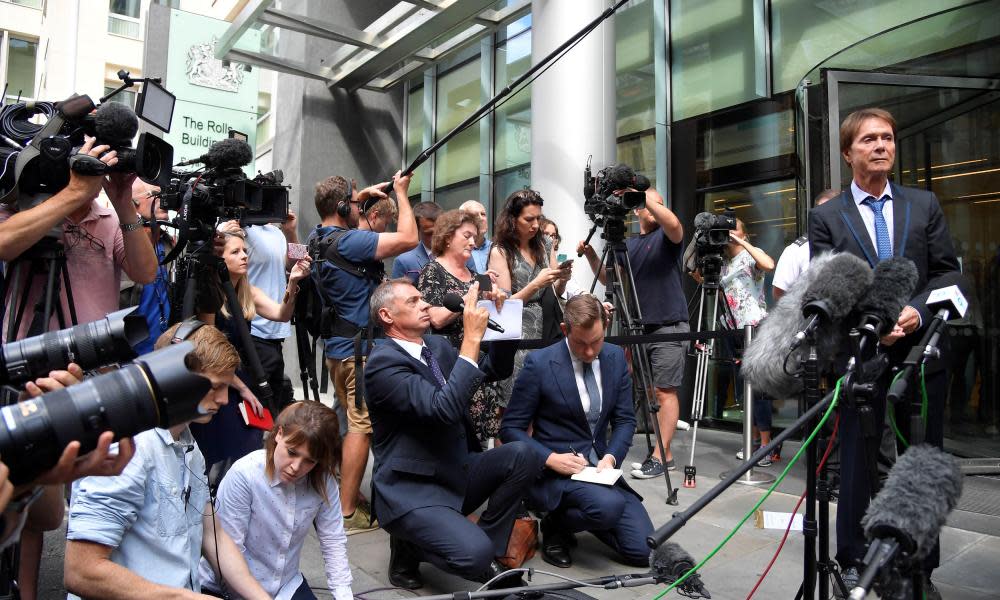The Cliff Richard ruling is a blow to press freedom and must not stand

At the risk of a tasteless pun, it is reasonable to argue that the BBC’s use of a helicopter to report the police raid on Sir Cliff Richard’s house was over the top. Strangely, however, that was not the view of Mr Justice Mann, in his landmark ruling that the corporation’s journalists had seriously infringed Richard’s privacy. Despite referring to the coverage as “sensationalist”, the worrying fact is that the judge did not award Richard £210,000 damages because of the corporation’s extraordinary decision to employ a helicopter. He did so on the basis that naming the singer was itself unlawful. As far as he was concerned, the methodology used to obtain the story was irrelevant.
In so doing, he has created a precedent with worrying implications for press freedom. It suggests that reporting the identity of anyone whose home is raided, or who is known to be under police investigation prior to being arrested or charged, amounts to an intrusion into their privacy. It means that Mann has broken new legal ground by rebalancing the two articles in the European convention on human rights that deal with respect for private life and freedom of expression. He has decided that article 8, the right to privacy, now trumps article 10, the public’s right to know.
Critics of journalism will doubtless take heart from the ruling in the belief that the public’s right to know is merely an excuse for the publication and broadcasting of information to excite prurience. But to do the opposite – to seal off police investigations, including house raids, from public scrutiny – takes us down a dark road. How are police to be held accountable for their actions unless we reveal what they have done and are doing?
There are several aspects to the Richard case that demand a rethink, which may well occur because I am given to understand that the BBC will, quite rightly, launch an appeal against this judgment. Although a section of the press remains antipathetic to Britain’s public service broadcaster, newspaper editors would do well to support an appeal because it is in their interests, and those of their readers, to ensure the ruling does not stand.
In a sense, this amounts to judge-made law. As the BBC’s counsel, Gavin Millar QC, observed in court, parliament has never previously thought it necessary to prevent the reporting of police actions, including the execution of search warrants. The press, he said, has been “free to report on such matters without any form of legislative restraint”. Therefore, Mann has stepped into new territory on this issue and in so doing has failed to take account of the realities of the modern, digital world. He suggested that it would have been fine for the BBC to show footage of the police entering and searching Richard’s property, but not to identify him as the owner and the subject of the investigation. Yet neighbours, passers-by and other people living in the vicinity would know his identity. Would all of them be able to hold back from posting hints on social media?
There is less secrecy in our society nowadays than at any time in history. To imagine that police could raid the home of a high-profile person and that people would walk on by and button their lips is unimaginable. The inevitable result would be the retailing of the kind of gossip and innuendo that the judge seems to believe can be stamped out by gagging the mainstream media.
Down the years, editors who discovered that someone was under investigation by the police always had to decide whether there was a public interest justification to publish. Now the bar has been raised to an alarming height. And the more famous a person is, the more difficult it will be to make that decision because, as is obvious, famous people have a greater need than the ordinary citizen to protect their public reputation. Yet, of course, it is the famous who will seek to benefit from avoiding the spotlight.
One of the most positive features of the investigations into cases of historical sexual crimes was the way in which publicity led to victims coming forward. That was undoubtedly in the wider public interest. Any restriction on the press will inhibit justice.
Note also the size of the award made to Richard. It is far greater than the previous highest award in a privacy action – the £60,000 granted to Max Mosley in 2008 when the now-defunct News of the World splashed his sexual antics over its front page and ran intimate video footage on its website. Indeed, it is greater than most awards for defamation, implying that privacy has replaced libel as the go-to legal tool to frustrate legitimate media inquiries. Should this judgment be allowed to stand, the likely effect is a chilling of press freedom.
It also takes Britain still further away from the freedoms enjoyed by journalists in the United States due to the first amendment. That is significant because people who use social media are getting used to enjoying the American model of freedom of speech regardless of British restrictions. This judgment will therefore be viewed by them as unduly regressive.
• Roy Greenslade is professor of journalism at City University and a Guardian columnist

 Yahoo News
Yahoo News 
